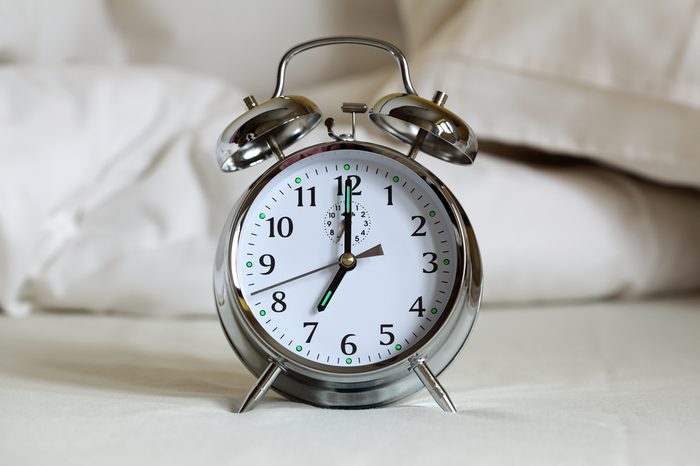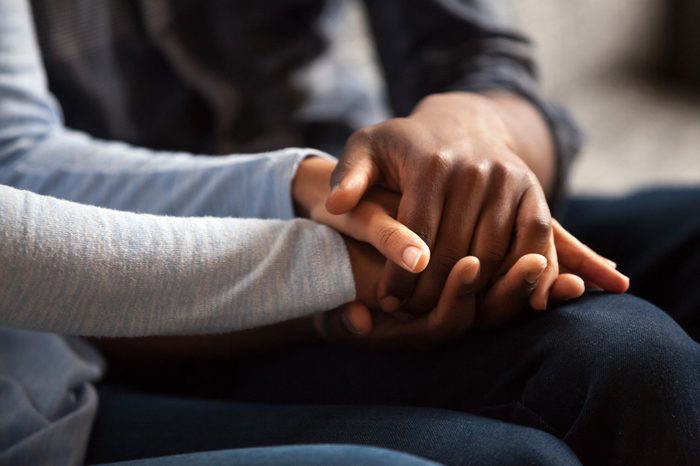
Marriage counsellors reveal common sex problems
It’s common for couples to experience problems with sexual compatibility over time. It can be due to stress, conflicting schedules, fatigue related to work or child-rearing, or some other factor. Some couples even become stuck in sexless marriages or partnerships for months or even years at a time. The loss of intimacy can be damaging to a relationship. However, there are ways to bring back the passion in your sex life, according to couples counsellors.
We asked therapists and counsellors to tell us what sexual problems they hear about most often, as well as the solutions they recommend to resolve them.
(Related: Why Covid-19 Is Killing Your Sex Drive)

We don’t have time for sex
“Between jobs, kids, taking care of the household, and social demands, you may feel like there’s no time left for each other,” says Jill Whitney, LMFT, a licensed marriage and family therapist who practices in Old Lyme, Connecticut and blogs about relationships and sexuality. “When you do have time together, it’s more likely to be collapsed on the sofa in front of Netflix rather than romping in the bedroom.”
Sex is an important way for partners to connect physically and emotionally, says Whitney. “It deserves to be a priority in your marriage.” She suggests blocking out uninterrupted time together. “Go on dates where you laugh and talk. Then come home early enough that you’re not too tired to get frisky,” she says. “Arrange an overnight babysitting swap with another family so you can bask in bed together on a Saturday morning. Do whatever you need to make sure sex remains a vibrant part of your marriage. It’s an important ‘glue’ that keeps you strong as a couple.”
(Related: 9 Things That Happen to Your Body If You Stop Having Sex)

Sex is now boring
It’s not unusual to feel like things have gotten a little stale when it comes to your sex life. However, a 2017 study published in the journal BMJ Open suggests this feeling can come sooner for women. Researchers found women reported a lack of interest in sex once they were in a relationship for more than a year. “Couples often figure out a pattern of lovemaking that works for them,” says Whitney. “One partner does this lovely thing, the other person does that, and everyone has a good time. Unfortunately, your typical way of making love gets old after a while. Your sex may still be pleasant, but it’s not exciting.” Whitney encourages couples to try something novel. “This could be something as simple as new lingerie, a slow massage, or watching a racy movie together,” she says. If you’re feeling a little braver, discuss your fantasies and try to act on them.
(Related: These Are the Most Common Sexual Fantasies)

My husband wants sex all the time
In heterosexual marriages, “many women want sex just as much as men,” says David Simonsen, PhD, LMFT, marriage and family therapist, who practices in Olympia, Washington. It’s common wisdom, though, that women place more value on the emotional connection as a spark of sexual desire. “They’re more emotionally in tune in the relationship. They don’t want to be intimate because they’re emotionally disconnected from their spouse,” he says. “Men value food, sex, and respect to be happy in a marriage. Women value security and everything that comes with that… emotional, physical, etc.”
(Related: This Is the Worst Time of Day to Have Sex)

We’re in a sexless marriage
Definitions of a sexless marriage vary. “Typically this means that the couple hasn’t had some sort of sexual connection in over a year,” says Paul Hokemeyer, PhD, an internationally renowned clinical and consulting psychotherapist. Hokemeyer says he explains to couples that they’re not alone. “Some studies put the percentage of sexless marriages at 20 percent,” he says. “Just knowing they’re not alone provides relief and remove the obstacles that have impeded their sexual functioning.”
Hokemeyer has the partners discuss why they haven’t had sex. He says he hardly hears anyone say that their partner is not sexually attractive. “In fact, the partners confirm that they still find their partner attractive,” he says. “Life, its responsibilities, and the aging of their—not their partner’s—bodies is the reason for their lack of sexual engagement.” Then the couples discuss and arrange how to make sex part of their life.
(Related: 6 Common Myths About Sex After 50 You Need to Stop Believing)

Sex is painful
“Sometimes there are legitimate medical reasons that a woman might not feel comfortable having sex,” says Gary Brown, PhD, LMFT, marriage and family therapist in Los Angeles. He says one physical condition is vaginismus, when the vaginal muscle involuntarily spasms. When this occurs, intercourse can be painful for a woman.
“Her partner should understand that she can’t control over when this occurs; it may happen infrequently or chronically,” he says. “Treatments are available once a diagnosis has been made.” In heterosexual relationships, the penis can also create pain during vaginal intercourse. Couples often go slow at first, and use lubricants. “No matter why sexual problems exist for any couple, it’s vital that they find ways to establish enough trust between them so that they can talk about what is and isn’t working in the bedroom,” he says. “Being in couples counselling may help bridge whatever gaps exist between them so that they can both enjoy a passionate and fulfilling love life together.”
(Related: 5 Myths About Your Lady Parts–Debunked)

Feelings of fatigue
Constant fatigue can bring your sex life to a halt. “The old, ‘Not tonight; I have a headache’ has turned into ‘Not tonight; I’m exhausted,'” says Gilda Carle, PhD, relationship expert, and author of 8 Steps to a Sizzling Marriage. Consider rearranging what’s important in your life so you have enough energy for intimacy. “Long after you leave your career or your neighbourhood, it’s your partner who will be your steady anchor of support—unless you push him away in favour of everything else,” says Carle. “You must decide how important to you your partner really is.”
(Related: Why Does My Husband Only Touch Me When He Wants Sex?)

One person is emotionally ready. The other wants to be physically ready.
“One person, usually the woman, wants to feel close emotionally to her partner before she’s interested in being sexual,” says Michele Weiner-Davis, MSW, and author of The Sex-Starved Marriage. “She wants to spend time together, talking and nurturing the ‘friendship’ aspect of the relationship.” The other person, usually the man, wants to feel close to his partner physically. “Being connected physically includes sexual, sensual, and affectionate touch and other flirtatious behaviours,” she says. What happens then is a vicious cycle. “If a man initiates sex to connect and the woman rejects the advances because she feels distant emotionally, he becomes hurt. His wife pulls away, becoming more physically averse.” That’s when they need to meet halfway. One person needs to make their partner feel appreciated, and other needs to be more physically affectionate. “Healthy relationships are built on mutual caretaking,” she says.
(Related: This Common Thing Happens When a Couple Stops Having Sex)

One person wants spontaneous sex. The other wants to schedule sex.
“The spontaneous partner associates good sex with ‘when-you-feel-like-it’ approach,” says Robert Taibbi, LCSW, a licensed clinical social worker who practices in Charlottesville, Virginia, and is author of Doing Couples Therapy. On the flip, some like to put it on the calendar. “The other partner says spontaneity on midnight on a Tuesday just doesn’t work when you have to get up early in the morning, they can’t relax because the kids are around, or they like being able to do some prepping,” says Taibbi. These couples should find a middle ground and find the best time to have sex. “They need to find some combination that is win-win,” he says.
(Related: Better Sex and More Intimacy—8 Habits of Connected Couples)

We aren’t in sync
“One wants to talk dirty and the other is disgusted. One wants to try different things and the other likes to keep it routine,” says Tina B. Tessina, PhD, psychotherapist and author of How to Be Happy Partners: Working It Out Together. “Often couples associate love with wanting the same things.” So, if your partner wants something other than what you want, it can be scary. For example, sex is like eating. “You can have different tastes and appetites but still find a way to enjoy eating together,” she says.
Tessina also helps couples talk about their likes and dislikes, without making the other wrong. “Almost always, sexual differences can be bridged with a little of what one partner wants and some of what the other partner wants,” she says. “They can even grow to enjoy each other’s favourite things.”
(Related: 14 Ways to Enjoy Better Sex as You Age)

Our sex life is changing
With life comes changes like illness, disability, aging, weight differences, and more. You may need to modify your sex life to go with your new normal. “You and your partner need to learn to adapt and grow as you go through life changes, creating new excitement and renewing energy,” says Tessina. “Tools, sex toys, lubricants, videos, and other aids can help you and your partner enhance your sexual connection and explore new options. Do whatever you can to keep your physical connection alive.”
(Related: Everything You Need to Know About Lube)

We’ve lost our passion
“Turning the heat back on takes an understanding of why the flames went out,” says Tom Murray, PhD, LMFT, marriage and family therapist, who practices in Greensboro, North Carolina. “A big reason for wildfires at the beginning of a relationship is the context; not much was known between you and everything was a mystery.” Now, everyday life stressors like jobs, kids, and a mortgage change everything. “Change the context and reignite the flames,” he says. Try communicating more, putting your phones down, and getting the TV out of the bedroom.
(Related: Alright, Tell Me More About Tantric Sex)

I have no desire to get frisky
When you have little or low drive for sex, try going back to the basics. “Couples should broaden their definition of sex to include activity other than intercourse,” says Mindy Utay, LCSW, JD, a licensed clinical social worker who practices in New York. “It can be any physical contact between partners done lovingly and tenderly.” Utay suggests holding hands, stroking one another, kissing, or just being in each other’s arms. “It takes the pressure off the act of sex and reimagines it,” she says. “This often opens the door to more physical contact and a gradual reconnection through physicality and eroticism.”
(Related: 31 Natural Libido Boosters to Help You Have Better Sex)

Our libidos aren’t in tune
“Couples struggle with not having a desire for a sexual connection at the same time,” says Laura Heck, co-host of Marriage Therapy Radio, who has a private practice in Salt Lake City. You can waste a lot of time waiting to always be on the same page, though. Instead, she suggests that you create sexual desire. “If you know your partner has a tried and true sexual arousal in the evening after the kids are put to bed, then start priming your mind and body earlier in the day,” says Heck.
(Related: What’s Normal When it Comes to the Female Libido?)

We argue. Then I don’t want sex.
You argue about how messy the house is or how they forgot to pay the water bill. This can kill your interest in sex. “Even if one partner can ‘forget’ about the bickering, the other may still be angry,” says Carla Marie Manly, PhD, a clinical psychologist and author of the forthcoming Joy From Fear. “Many a partner has said to me, ‘I can’t believe he would even think I’d want to have sex after such horrible behaviour.” Manly suggests you both need to make the effort to be more respectful and kind to one another first, then sexual intimacy can grow and blossom.
(Related: How to Stop Fighting So Much With Your Partner, According to Relationship Experts)

I always have to initiate
Resentment happens if one partner feels like they always have to initiate intimacy. “They feel that if they didn’t initiate, nothing would ever happen,” says Lesli Doares, a marriage consultant and coach with a private practice in Cary, North Carolina, and author of Blueprint for a Lasting Marriage: How to Create Your Happily Ever After With More Intention, Less Work. “They’re the one being set up for rejection.” That leaves one partner feeling undesired. “The person with the lower libido becomes the gatekeeper for sex,” says Doares. Adopt a willing mindset and initiate at least once a month, she suggests. Then honour that commitment.
(Related: 4 Ways to Have a More Lustful Marriage)

They won’t try things I want to do
Sometimes a partner only fixates on his or her wants and needs. It does no good when one partner’s needs are ignored. “No one should feel forced to do something that they’re uncomfortable with,” says Toni Coleman, LCSW, CMC, a licensed clinical social worker, psychotherapist and relationship coach who practices in McLean, Virginia. Coleman suggests that couples discuss their feelings and reach a compromise. “Both of you should be satisfied and motivated to have a fulfilling sex life,” she says.
